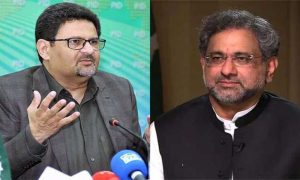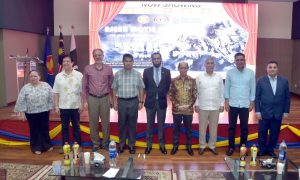ISLAMABAD: Pakistan’s Ministry of Education has initiated several projects aimed at enhancing facilities for students in government schools and colleges in Islamabad, the federal capital of the country.
Speaking at an information session organized by WE News in collaboration with the Federal Ministry of Education in Islamabad, Federal Education Secretary Mohiuddin Ahmed Wani said that the objective of these projects is to ensure that government schools now offer better amenities compared to private institutions. As part of this effort, the curriculum has been streamlined, reducing the number of subjects taught from five to three.
Elaborating on the new educational initiatives, Mohiuddin Wani said primary-level examinations have been eliminated, while the marking of matric exams will be done through artificial intelligence, and the results will be prepared in 15 days. Furthermore, these results will not be made public but will be shared with the students or their parents.
He said that they are now focusing on upgrading IT labs, infrastructure, libraries, and converting classrooms into smart classrooms in public schools. To support these endeavors, the government has promised Rs. 25 billion annual budget, a substantial increase from the previous allocation of Rs. 8 billion.
Secretary Wani said that school principals have been empowered with all powers and budgets delegated to them except for posting decisions, to improve schools’ governance and performance and ensure world-class education.
He further went on to say that his target is to improve the infrastructure of all 432 government schools in the federal capital and equip the schools with modern technology.
He said that the requirement of a B-form for admission of students has been abolished.
Under the “Dream Pakistan” project, the Ministry aims to revolutionize education by providing quality schooling environments and free evening workspace for IT workers in school and college halls. Furthermore, a plan has been finalized to transform all schools into solar energy systems.
Media’s Role Extends Beyond News Reporting: Ammar Masood,
Speaking at the beginning of the session, Chief Editor of WE News, Ammar Masood, stressed the media’s role in social awareness and reform.
He said that it is not only the responsibility of media organizations to report, but it is also important for the media to aware masses by giving the opportunity to experts in every field to contribute to problem-solving efforts.
Director News of WE News, Waseem Abbasi, lauded Secretary Mohiuddin Ahmad Wani’s exemplary work in education, emphasizing the need for more individuals to approach their roles as responsibilities rather than mere jobs.
He underscored Wani’s dedication to improving infrastructure, curriculum, and educational quality across government schools in Islamabad.

























